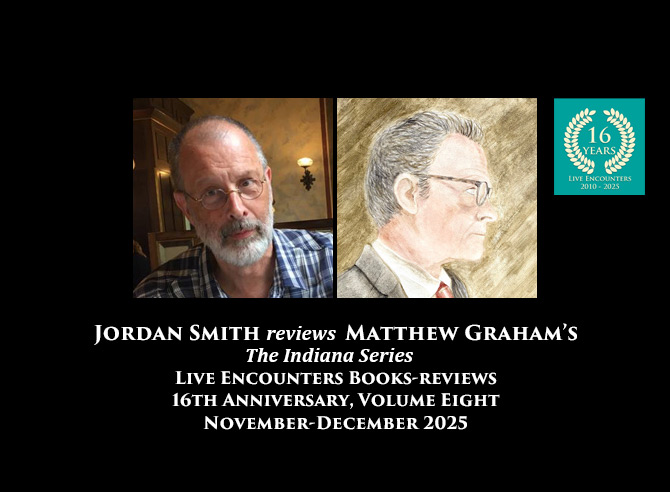
Live Encounters Books-Reviews Volume Seven
November- December 2025
Jordan Smith Review of
The Indiana Series by Matthew Graham
Galileo Press, 2025

Minute Biographies: On Matthew Graham’s The Indiana Series.
When I was a kid, I loved my father’s battered copy of Minute Biographies, a book from the 1930s, on each page a picture, in that old Depression-era style of illustration, of a famous person, and around it two or three paragraphs extolling their accomplishments. Joan of Arc and John Burroughs, Napoleon and Aaron Burr. Later, I came to think of this genre as boys’ history, written with the same sort of character-driven enthusiasm for the-past-as-adventure that made its way onto the murals in my elementary school cafeteria and into the mythohistorical sections of Hart Crane’s The Bridge. Matthew Graham’s chapbook, The Indiana Series, also views history refracted through the characters of those who have lived it, but there is nothing boyish about his portraits, which aren’t the emblems of myth-making history. He sees these figures within their own acts of seeing, recognitions which are also acts of the poet’s making in which the world is reconstructed at least a little closer to the truth.
Recently the Poet Laureate of Indiana, Graham has taken that task seriously in this catalogue of the state’s residents and exiles, dispossessed and possessed. Cole Porter lands in the snow in Fort Wayne; he’ll leave soon enough, back to:
Back to someplace where the wit to rhyme gent with Pepsodent, Strauss with Mickey Mouse is the ticket to a life of tuxedos and champagne and other pleasures. And still he comes home, “Always, for now.” (“Beginning with a Line from Cole Porter”) Robert Johnson plays a gig on Indiana Avenue and finds himself in a Greyhound station on a Sunday afternoon having netted less than twenty bucks and a fight for his trouble; He won’t be back. (“Indiana Avenue”) Mari Evans looks out from her mural in Indianapolis, “down gentrified Mass Ave,” remembering years of segregation and violence, a history about to be erased by “the great machines of white renewal.” (“Beginning with a Line from Mari Evans”) Tecumseh, engraved, is a sharp reminder of “confederations and ceaseless betrayal.” (“Beginning with a Line from Tecumseh”) The repeated formula of the titles, the suggestion that our understanding of the past begins with the words of those who lived it, is also the acknowledgment that beginnings only take us so far. We still must be witnesses to what follows.
And so in “Central Standard Time,” Graham begins with what’s to be known in a hobo’s landscape:
Tattooed against the shimmering horizon:
The brakeman’s yawn, the crop duster’s cough,
The gravedigger’s bad back.
The tracks and trains and grain silos
And watchful water towers of the known world.
This is the world of occupations and their hazards, of the intersection of the local and the transient, and soon enough we’re in a cantina at the crossroads, “a sour cell block in Pendleton,” a derelict hotel, a pickup truck amongst “these fields of brown faces.” In this sympathetic tribute to labor and migration, Graham invokes the rover of Crane’s “Indiana,” that poem’s mournful, hopeful last quatrain translated into Spanish. And in “Indiana,” located in his own town of Evansville, he moves through memories of the war industries that once employed women while their men fought, past “the moored, fake stern-wheeled / Party boat,” “the sunken dry docks” where the craft built for the invasion of Normandy were moored, only to find himself heart-broken in the bus station, “all late 30s / Science fiction,” where once people had arrived in town, “rolled up their sleeves,” and found their work. The town has “evacuated / Itself from time.” For redemption, it needs a memorial, a memory, a sense that the irony (the munitions factories now make washing machines, and “We know what happened / To the women who built the planes. / They’re doing the wash.”) might count for something.
To make irony matter is the poet’s work, and Graham has rolled up his sleeves and gotten down to the job of using the past to take the present to task. We live in, are shaped by, act out and act out of a history we barely recognize, and if we let it, it meets us where we are. “The small and local must survive somehow,” sings Greg Brown, from his home in a state right next door to Indiana, (“It’s Your Town Now”), and if they don’t, then neither do we, not as we dreamed we would, not as we would want to be.
© Jordan Smith
Jordan Smith is the author of eight full-length books of poems, most recently Little Black Train, winner of the Three Mile Harbor Press Prize and Clare’s Empire, a fantasia on the life and work of John Clare from The Hydroelectric Press, as well as several chapbooks, including Cold Night, Long Dog from Ambidextrous Bloodhound Press. The recipient of fellowships from the John Simon Guggenheim and Ingram Merrill foundations, he is the Edward Everett Hale Jr., Professor of English at Union College.
Matthew Graham is a professor emeritus of English at the University of Southern Indiana and is a former Indiana State Poet Laureate. He is a author of four previous collections of poetry.

